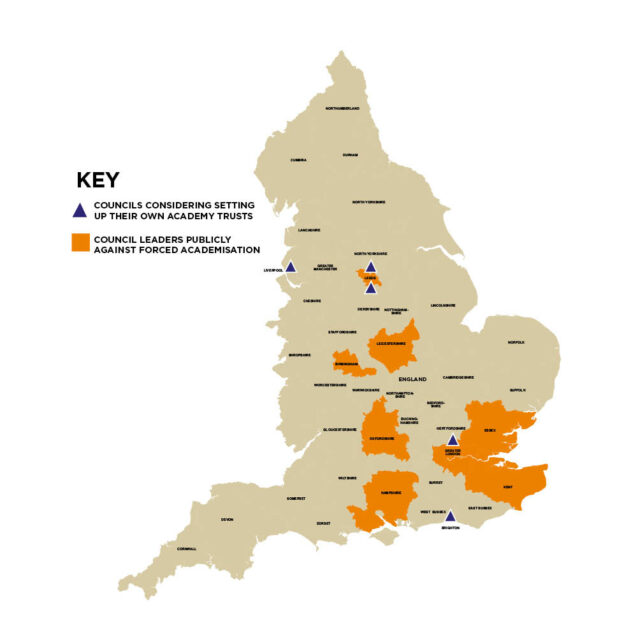Councils are beginning to mobilise against the government’s all-out academisation plans, with some aiming to retain their role in schools by setting up academy trusts.
Birmingham City Council, which is in a key election battleground, last week rejected several white paper policies, including that all local authority-maintained schools must become academies by 2022.
Its decision follows outcries from leaders of other councils, some of which have local elections next month.
The Local Government Association (LGA) has already said it is opposed to forced academisation. It has now urged ministers to consider the wishes of councils before imposing any new structures.
In its motion, Birmingham said the government should not force “well-achieving schools into a reorganisation that the school does not believe to be in the best interests of its pupils”.
It also called for the requirement for parental representation on governing bodies to be retained, and demanded the council be reimbursed for the conversion costs it now faces.
Figures suggest that about 250 schools are yet to convert in Birmingham at a cost, the council estimates, of between £5,000 to £15,000. If each falls into the mid-range of £10,000, then the council could face a bill of £2.5 million.
Schools Week revealed last month how the London borough of Camden has taken the first step to setting up its own multi-academy trust. Other councils have since been reported as exploring their options.
Roy Perry, Conservative leader of Hampshire County Council and the LGA’s children and young people board chair, said his council has raised concerns with the Department for Education (DfE).
“We are keen to engage with them on a range of important questions raised by the white paper.”
Melinda Tilley, cabinet member for education at Oxfordshire county council, which covers the prime minister’s constituency, called the plans “bonkers”.
She said the council was determined to keep all its academies in “our family” of schools, but said this had now been “blown out of the water”.
Camden councillors recently voted to make the Camden Schools Led Partnership a legal entity, paving the way for the company to become an academy sponsor.
Warren Morgan, Labour leader of Brighton council, has said that his council will look at establishing a co-operative trust to run local-authority maintained schools.
Eighty-two per cent of the city’s schools are rated as good or outstanding by Ofsted, only three of which are academies.
He said the council would “maintain as much local control as possible and prevent multi-academy trusts from cherry-picking the popular schools and leaving the rest to struggle”.
Liverpool, Leeds and North Yorkshire councils have also all been reported as showing an interest in setting up their
own trusts.
Chancellor George Osborne said last year the academies revolution would make “local authorities running schools a thing of the past”.
But that stance appears to have been softened with the government now expecting the “best talent in local authority teams” to set up new trusts.
However, all new sponsors would have to be approved by regional schools commissioners.
A DfE spokesperson said the white paper reforms were the next step in ensuring every child had access to an “excellent education by putting control in the hands of the teachers and school leaders who know their pupils best.
“We want to work constructively with the sector to deliver this and ensure standards continue to rise.”
Click on the image for a larger version








Factual correction – on your map you have conflated Birmingham and Coventry. I
It’s not my reading of the position a Council CAN, currently,set up its own MAT as things stand, given not least the 19.9% limitation on LA employed/connected staff on Boards. In response to a query from me on behalf of NCOGS he said:”… we want to ensure that the schools system
continues to benefit from the expertise of the best people in local
authority teams and it recognises that there is some very effective
practice within local authority school improvement teams and we expect
that the strongest people in them may establish new academy trusts or take
up positions within existing ones. I welcome this as my vision is to
ensure that we get a single dynamic education system and we will need the
talent we have in the system wherever it is to support this.
…trusts proposed for establishment by LA employees will
be subject to our usual sponsor approval process overseen by RSCs so they
will need to be able to demonstrate a strong track record of school
improvement. This would be exactly the same approach that I would want
to take with any new proposal from any group of leaders. Where an academy
trust, led by former LA employees has been established, we will want to
avoid simply re-creating geographical monopolies and ensure that local
schools choose to ‘opt-in’ to the trust. In order to make sure that such
entities are viable we would expect LAs and the staff establishing the
trust to be sure that there were a number of schools interested in joining
such a MAT. As a side note to this, I think there is huge potential for
trusts made up in this way to sponsor schools beyond their immediate
geographical boundary. In the SW for example, if a team in Cornwall from
the LA wanted to create a MAT I would be interested in them supporting
schools in Devon or Dorset for example. This would be a good counter
argument to new LA inspired MATS simply working with the schools who feel
they would be “safe” here rather than challenged.. ”
That’s a helpful clarification of his thinking. I believe there enormous confusion outb there, which is not surprising really!